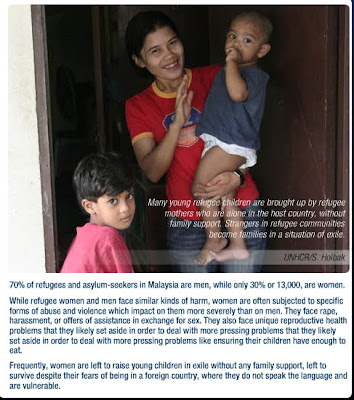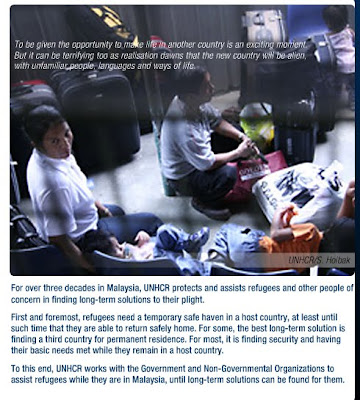Refugees in Malaysia arrested, abused and denied right to work
Refugees in Malaysia arrested, abused and denied right to work
Refugees are refused legal recognition, protection, or the right to work
© AP Photo/Marcus Yam
The volunteer police force RELA arbitrarily detains refugees and asylum-seekers
© Amnesty International
16 June 2010
The Malaysian government should give refugees in the country the right to work, Amnesty International said on Wednesday as it revealed a litany of abuses suffered by refugees in Malaysia, the vast majority of whom are from Myanmar.
Released ahead of World Refugee Day on 20 June, the report Abused and Abandoned: Refugees Denied Rights in Malaysia documents the plight of refugees and asylum-seekers who have reached Malaysia, where they are refused legal recognition, protection, or the right to work.
"Refugees should be able to live with dignity while they are in Malaysia. The government should move immediately to issue refugees official ID cards and grant them the right to work," said Chris Nash, Head of Refugee and Migrant Rights at Amnesty International.
Refugees and asylum-seekers in Malaysia are subjected to arbitrary arrest, detention in appalling conditions, caning, extortion, human trafficking and deportation back to the persecution that they fled.
In February, Malaysian Home Secretary Hishamuddin Hussein proposed the introduction of government ID cards for UN-recognized refugees, and stated that refugees should be able to take on "odd jobs" but not have the full right to work. However, no concrete steps have been taken to introduce the ID cards since then.
Government ID cards would give refugees and asylum-seekers in Malaysia some immediate protection from arbitrary detention, harassment and extortion by police and the People's Volunteer Corps (RELA), who routinely refuse to recognize cards issued by the UN Refugee Agency (UNHCR).
The Malaysian volunteer police force RELA continues to operate in a climate of impunity, despite recent government assurances that the organization would cease to be involved in immigration enforcement.
The US Department of State 2010 Trafficking in Persons report confirmed this week that RELA arbitrarily detains refugees and asylum-seekers, that "refugees were particularly vulnerable to trafficking", and that despite government efforts, there was limited progress in convicting traffickers.
Amnesty International said it acknowledges that in the last year Malaysian officials have stopped handing refugees and asylum-seekers to human traffickers operating on the Thai-Malaysian border.
"There is a long way to go for Malaysia on refugee rights, but government-issued ID cards are a start. This is the right time for Malaysia to take this very simple, but concrete and positive step that will make a huge difference to the lives of tens of thousands of refugees and asylum-seekers in the country," said Chris Nash.
Amnesty International has urged the government to continue to improve refugee policies, including by building on its cooperation with the UNHCR instructing law enforcement agencies to stop detaining UNHCR card-holders.
It has also urged other countries to increase their resettlement of refugees currently in Malaysia.
Resettlement provides a small number of refugees with the opportunity to rebuild their lives in countries such as Australia, Canada, the United States and in Europe. However, there has been a notable lack of resettlement of the Muslim Rohingya ethnic minority from Myanmar.
Malaysia has not ratified the Refugee Convention, and refugees and asylum seekers are treated as irregular or undocumented workers under Malaysian law. UNHCR is the only authority in the country that recognizes refugees and offers them any assistance.
There are 84,200 refugees and asylum-seekers registered with UNHCR in Malaysia, although the numbers of unregistered people in similar circumstances are estimated to be over twice that.
Over 90 per cent of registered refugees and asylum-seekers in Malaysia are from Myanmar.
This work is part of Amnesty International's Demand Dignity campaign, which aims to end the human rights violations that drive and deepen global poverty. The campaign will mobilize people all over the world to demand that governments, corporations and others who have power listen to the voices of those living in poverty and recognise and protect their rights. For more information visit the Demand Dignity website.
Malaysia is 'home' to between 90,000 and 170,000 refugees and asylum-seekers, most of whom end up living in its urban centres. They come to Malaysia seeking safety, having fled situations of torture, persecution or death threats. But once they arrive, they are abused, exploited, arrested and locked-up – in effect treated like criminals. This report focuses on the human rights violations experienced by refugees and asylum-seekers in Malaysia. These rights must be respected in line with international standards. A coherent migration policy should be implemented.
Photo credit : http://www.unhcr.org.my/project/unhcr/theme/images/swf/refugeesinmsia.swf










Comments